

“Money is the mother’s milk of politics,” Gloria Romero tells me on the phone. “It’s flowing to both sides. Government isn’t about drawing lines. It’s not about saying you’re on that side and you can’t come over.”
Her voice is friendly, somewhat placid, but it’s clear Romero is not thrilled with having to answer questions about her political alliance with the Koch brothers and other wealthy supporters of Proposition 32, and she conspicuously avoids bringing up their names. When pressed about the Kochs and the money behind behind Prop. 32, she falls back upon her experience in Sacramento.
“I have sat in the belly of the beast,” she says. “I have seen the realities of money and its influence.”
With Election Day still one month away, the battle to pass Prop. 32 has seen its share of political shockers, including the sudden injection of $4 million of Koch brother money to the Yes on 32 campaign,
» Read more about: How Gloria Romero Became the Face of Proposition 32 »
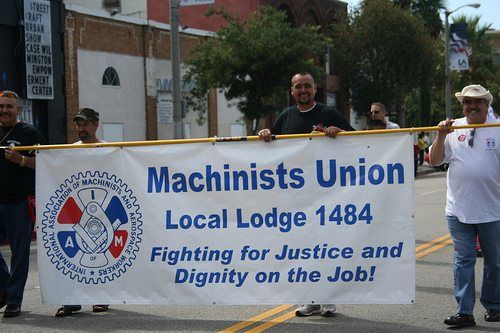
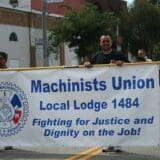
This legislative session brought some exciting victories as well as some deep disappointments. Labor accomplished big things this year that benefit all Californians but when it came to advancing worker protections, many of those bills were vetoed.
Successes:
» Read more about: State Labor Legislation, 2012: Wins and Losses »


(The following message from Edward James Olmos is republished from the L.A. County Federation of Labor, AFL-CIO, with permission. The concert mentioned took place Oct. 3.)
Forgive me, but I’m going to be blunt. Proposition 32, the so called “Stop Special Interest Money Now Act” is a misleading, cynical and unfair attack on working families and labor unions.
That’s why I’m standing with Working Californians and their No on Prop 32 campaign. And that’s why Crosby, Stills & Nash and Tom Morello: The Nightwatchman are joining Working Californians to play a special benefit concert in support of the No on Prop 32 campaign this October 3rd at Nokia Theatre L.A. LIVE. Want to come and join me?
Get your free ticket for the No on Prop 32 concert with Crosby, Stills & Nash and Tom Morello: The Nightwatchman, at the link below:
https://action.truthonprop32.org/concert
The people behind Prop 32 wrote in giant loopholes and created special exemptions to give billionaire CEOs,
» Read more about: Edward James Olmos: Come to the Stop Prop. 32 Concert »
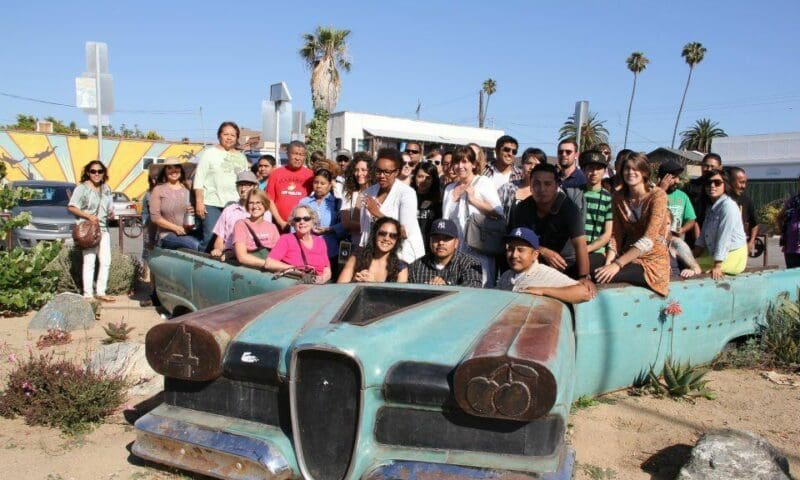

The opponents of the proposed Long Beach Living Wage are just getting organized. They’ve run an ad on Craigslist offering “a very competitive hourly wage” of $15 an hour to fight a measure that would guarantee a modest $13 an hour and five sick days for about 2,000 workers –housekeepers, cooks, dishwashers and janitors — who labor in the largest Long Beach hotels. I find it ironic that the opponents of Measure N themselves are offering more than the Living Wage proposal would mandate, clearly aware that $13 an hour isn’t a high enough wage to attract even part-time workers. Yet their campaign messages suggest the hotel Living Wage could do drastic damage to the city’s economy.
“We’re going to reach out to the residents of Long Beach at the grassroots level, neighbor to neighbor and relay our message- No on N,” says the job posting. If theirs were truly a grassroots campaign they would have plenty of community volunteers lined up to talk to Long Beach voters.
» Read more about: Long Beach Living Wage Foes Seek Backers on Craigslist »
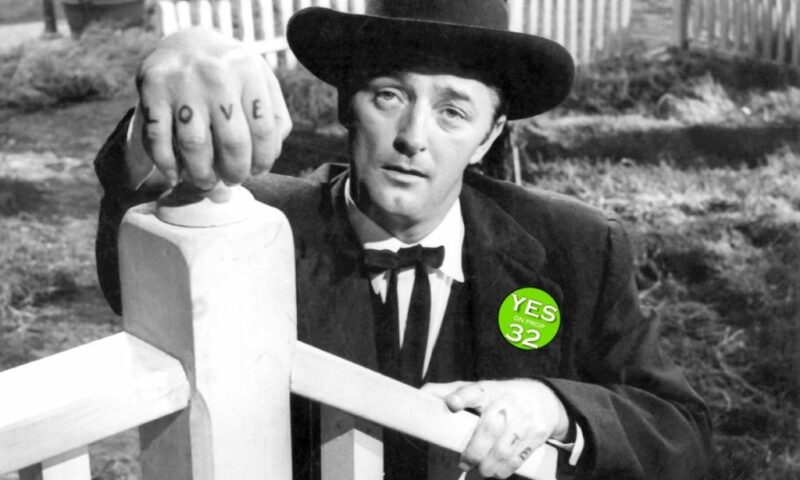

Today’s body politic has no shortage of rhetorical bile, but no campaign attack ad comes close to matching 1988’s race-baiting Willie Horton commercial for sheer visceral partisanship.
Horton was a black murder convict who raped a woman and stabbed her male companion while on a weekend furlough from a Massachusetts prison. The ad — which showed a photo of Horton, with the words “raping” and “stabbing” flashing behind him – blamed former Massachusetts Governor and then-presidential candidate Michael Dukakis for Horton’s release. It is generally thought of as a low-water mark in American politics—stoking racial stereotypes in a Machiavellian push for victory at any cost. But it worked. Dukakis never recovered from the attack and George H.W. Bush went on to win the presidency.
Rather than facing censure, the political consulting outfit behind the Horton ad, the Dolphin Group, has thrived ever since.
» Read more about: The Dolphin Group: Prop. 32's Dark Messenger »


» Read more about: Lalo Alcaraz: Proposition 32's Super Backers »


The Koch brothers entered California’s political fray September 14, a Friday, with a $4 million donation to a new pro-Proposition 32 political entity called California Future Fund. By Tuesday, September 18, the fund had released its first TV spot, titled “Telephoto.” What does $4 million in Koch cash buy? Let’s take a look at this half-minute spot, shot by shot.
00 min. 01 sec. – If we had millions of dollars of Koch brother money, maybe we could afford a telephoto lens too.
00:06 – Clearly not shot with a telephoto lens. Thematically, the scene should have been shot through the open window. Instead, our supposedly heroic cameraperson with a telephoto lens of moral clarity is physically inside the room with the shady suits. They look quite comfortable with his presence. A perfect metaphor for Prop. 32.
00:10 – “Big corporations and government unions control politicians,” our ominously-voiced narrator tells us.
» Read more about: Framed: Proposition 32's Deceptive TV Ad »


NRDC [Natural Resources Defense Fund] and Move LA released a report today touting the expansive benefits of sustainability planning in three of California’s largest cities—representing nearly two-thirds of the state’s population. The report explores how Los Angeles, Sacramento and San Diego are already building the cities of the future thanks to the Sustainable Communities and Climate Protection Act, or SB 375, authored by Senator Darrell Steinberg in 2008.
Four years ago, SB 375 was nothing less than a revolution in the way California plans for growth. It linked regional transportation planning to reducing greenhouse gas emissions, encouraging a wide range of travel options and giving Californians the kinds of communities they want.
Our analysis found that enacting SB 375 into law was an achievement that distinguished California as a national leader in creating communities that meet both our economic and environmental challenges.
» Read more about: SB 1156: A New Tool for Sustainable Development »


In 15 days, food stamp benefits will be cut by some 20 percent, thanks to Republicans in Congress who tossed this mean-spirited gem into one of GOP’s hostage bills that President Obama was forced to sign because a veto would result in the government shutting down, or the US reneging on its bills, or something equally destructive.
On October 1, millions will see their benefits stripped away or cut greatly.
Most unemployed people will get cut off. Many working poor, who rely on food stamps to make ends meet, will go hungry. So, too, will countless military families – a separate disgrace in and of itself. Far too many homeless families and individuals will find their chair at the dinner table yanked away just as they are sitting down to eat, a sight gag that hasn’t been funny since it was pulled on Fatty Arbuckle in some of his movies back in the Twenties.
» Read more about: Food Stamp Cuts on the Line in Congress »


Political money is a featured dish on the spending menu of Tampa-based Outback Steakhouse restaurants. The chain was controlled by Bain Capital until last month, when its parent, Bloomin’ Brands, went public in an Initial Public Offering. Bain and its investors stand to earn an estimated 88 percent return on their investment in the company.
Almost everyone now knows Bain’s critical role in building Mitt Romney’s wealth as a leading light of the 1 percent. And, Ann and Mitt Romney are investors in the particular Bain fund that bought and then sold Bloomin’ Brands.
But few noticed that Outback’s Political Action Committee (OSI PAC, also known as OSI Restaurant Partners) this year emerged as the restaurant industry’s biggest political donor. So far in 2012, OSI PAC has given more money to political candidates than the PACs of any of these bigger and better known firms: Coca-Cola, McDonald’s, Pepsi, Taco Bell,
» Read more about: Low-Wage Sizzle: Outback Steakhouse PAC »


Why does California reward ultra-rich companies that move jobs out of the state?
We’ll tell you why. In 2009, during secret, behind-closed-doors budget negotiations, a handful of state legislators and Gov. Schwarzenegger snuck in a colossal but little-known corporate tax giveaway into the budget in the dead of night. This loophole, known as the “elective single sales factor,” gives corporations the option to reduce the taxes they pay to California by keeping jobs and investment in other states – giving companies a huge incentive to hire outside of California. The loophole has already cost the state tens of thousands of jobs, and the only ones who are benefitting from it are California’s richest corporations. In fact, 80 percent of the benefits from this loophole go to the 0.1 percent of California corporations with gross incomes over $1 billion.
It’s high time we end the practice of shelling out taxpayer money to ultra-profitable companies that kill California jobs.
» Read more about: Proposition 39: Bringing Jobs Back to California »


How different would California look with Proposition 32’s passage? To imagine, it’s not necessary to focus on a Golden State without the legacy of its unions, but rather to think of a California in which only the rich and powerful have a say in Sacramento and in the polling booth.
“It will have a devastating effect,” says John Logan, director of Labor Studies at San Francisco State University, of Prop. 32’s impact. “California would be transformed as a state.”
On environmental issues alone, Prop. 32 stands to roll back decades of progress in making California a global leader in green policy-making.
“You don’t have to go very far back to find likely examples of how it would change California,” Logan says, adding that Prop. 32 would remove labor’s voice from nearly all political conversations.
That voice is not always confined to lobbying efforts in the state legislature.
» Read more about: If Proposition 32 Passes: A Not-So-Green Golden State »

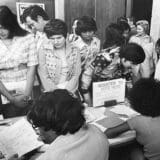
This Thursday the L.A. Library Foundation’s ALOUD program hosts a panel discussion about the possibility of thawing America’s internal cold war in political discourse. The Advancement Project‘s Connie Rice joins U.C. Irvine Professor Rick Hasen (this year’s go-to man on political polarization), along with KPCC immigration correspondent Leslie Berestein Rojas, Young Republican leader Nicole Stygar and USC/Norman Lear Center chair Marty Kaplan to answer the question, “The Voting Wars: How Do We Move Beyond Partisanship and Polarization—or Should We?”
The discussion promises to be lively and enlightening – with the delicious possibility of shouting matches and chair-throwing. (Just kidding.) Like voting itself, the event is free, but reservations are necessary by visiting ALOUDS’s site or calling (213) 228-7025.
Mark Taper Auditorium-Central Library, September 20, 7:15 p.m.
» Read more about: Poles Apart: Can Consensus Exist in America? »


“Hi. I’m a volunteer with the We Buy Local campaign here in Long Beach.”
So begins the conversation with undecided voters about the Long Beach living wage measure on the November ballot.
Most Long Beach hotel workers live, work and shop in the city. And if the hotel living wage passes, they’ll have more money to put into the Long Beach economy.
More than 100 volunteers and supporters gathered last Saturday to pick up information packets and start knocking on local doors. It was hot in the church classroom where they assembled, but the mood was electric.
More than 140 small business owners are supporting Measure N, as are local religious leaders and city council members Suja Lowenthal and Steve Neal.
College students and retired folks, LGBT activists, Cambodian youth organizers, religious leaders and politicians were all excited to be working together to change conditions for the city’s 2,000 hotel workers and to shake up the political environment in Long Beach.
» Read more about: Living Wages Would Boost Long Beach's Economy »


Today Frying Pan News launches a series of investigations into Proposition 32, a measure on the November ballot that, if passed, would drastically alter the political landscape in California. “Killing the California Dream” will shed light on Prop. 32’s backers and their motivations; analyze how major public policy decisions would be affected if Prop. 32 passes; and document how corporate money historically has run counter to the interests of most Californians, among other things. The series will run through the November 6 election.
“If Proposition 32 passes, corporate donations will flat-out dominate politics in California,” said Steven Mikulan, editor of Frying Pan News. “We’ve launched this investigative series to provide California voters with the facts about who is behind the measure and how the passage of Prop. 32 would enable corporations to determine policy on everything from health care, pensions and workplace safety to the environment, education and consumer protection. With so much at stake for California,
» Read more about: Frying Pan News Launches Series on Proposition 32 »
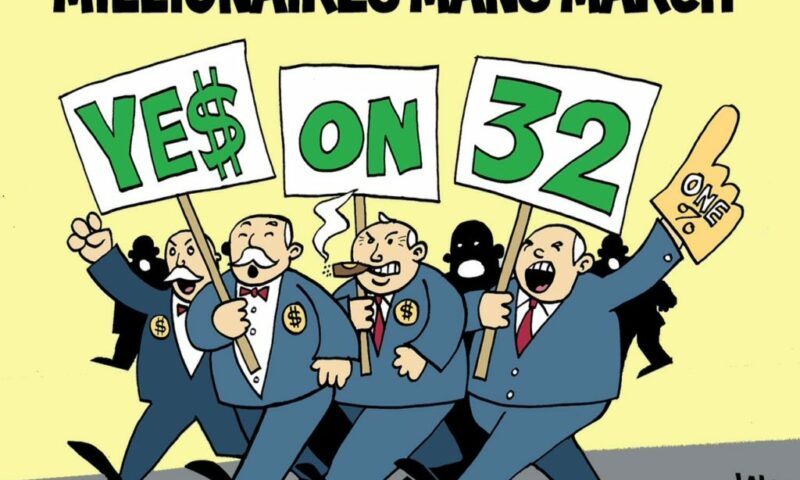
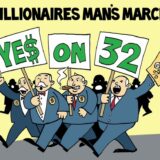
Click image to enlarge.
» Read more about: Lalo Alcaraz: Proposition 32's Grassroots Supporters »


The 2012 State Legislature adjourned on August 29th and now hundreds of bills sit, awaiting the Governor’s signature. One of those bills, Assembly Bill 2508 by Assemblywoman Susan Bonilla (D – Concord), will call back hundreds of jobs into California’s economy.
Current state law allows state public benefit contracts, including call-center contracts, to be awarded to contractors that perform the work outside of California, and even the United States. AB 2508 would prohibit state agencies that manage public benefit programs from contracting for call center services outside the state.
The federal and state economies are recovering from the great recession and California still has a high unemployment rate. Meanwhile, though it has cut services available to out-of-work and low-wage earners by over $15 billion over the past four years, California still spends billions on public benefits to help these individuals and families prevent hunger and homelessness and be prepared with the necessary job skills for when the economy bounces back.